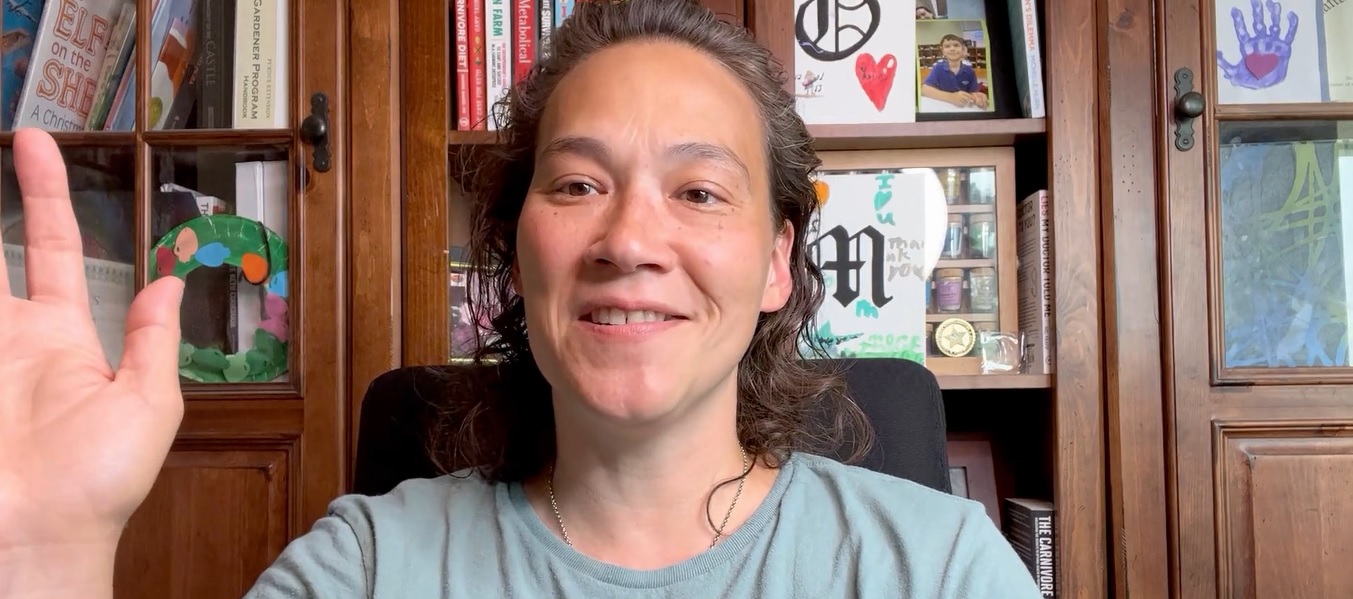How to Move Away From the “Diet Mindset” to Lose Weight for Good
Have you ever tried to get healthy but been discouraged by the numbers on your scale?
This habit plagued me for a long time. It still haunts me from time to time.
We become so trained to equate weight loss (the scale number) with success and health But health is so much more complex. We all have so much more to celebrate than those numbers moving in one direction or the other.
- Why won’t these numbers move?
- Why am I failing?
- Am I just doing everything wrong?
- Will I ever actually be healthy?
These questions, and so many more like them, ran through my head on a loop whenever I looked at the numbers on my scale.
Focusing only on the numbers on the scale can lead to a “diet mindset.”
When those numbers don’t match your expectations, it often triggers panic, a sense of failure, and frustration. This can push you into thinking, “I need to go on a diet right now.” If you feel this way, please don’t be too hard on yourself. Many people, myself included, have experienced these thoughts.
Unfortunately, society and our medical system condition us to believe that our overall weight is the best measure of health.
weight is a metric — BUT — it is not the only one that matters. too much fuss about “the number on the scale” will lead you astray.
When it comes to overall health, look at all the aspects, including:
- Mental
- Physical
- Spiritual
- Emotional
Numbers on your scale aren’t telling you the whole story and, when looked at in isolation, are doing you more harm than good.
Your health and well-being are so much more than just a number on a scale
For a really, really long time, all I ever did was chase those numbers. I weighed myself constantly, every day sometimes, in hopes of seeing those pounds just drop off my weight.
When I didn’t see a change, whether it was for a single day or over the course of a few days to a week, I would get frustrated, sad even.
I would start to question myself with those same questions that I listed at the start of this article and, since I didn’t have a relationship with God for a long time, I would truly see myself as a failure, a hopeless, inept, failure. It’s been a long time since I’ve felt that way.
Knowing who I am through God has played a huge role in changing how I see myself, despite what the scale tells me.
Another big driver in my change of outlook has been my focus on “non-scale” victories.
What’s a “non-scale” victory, and why does it matter for health and wellness?
It means recognizing wins, big or small, that aren’t about the numbers on a scale.
These victories help you understand why you’re on a journey toward better health—be it physical, mental, or spiritual.
They’re super important for the success of a lifestyle change, especially when it comes to tweaking nutrition or exercise habits.
What are some common “non-scale” victories?
They can be anything that you want them to be, as long as they are things that you would identify as a success.
The ones that I used were:
- Increased strength – Am I able to lift heavier things easier or faster than before? Can I get out of a chair or off the ground without help or using an object for leverage?
- Increased endurance – Can I walk up a flight of stairs without having to stop because I’m exhausted? How far can I walk or how long can I work out without having to stop and rest?
- Changes in body composition – Do my clothes fit better even though my weight isn’t changing?
- Changes in mood – Am I less crabby? Do I have more energy? Do I feel less stressed out or overwhelmed?
- Changes in how I feel physically – Do I feel bloated? Do I have headaches or other aches and pains anymore? Do I have stomach issues anymore? Do I get vertigo or tinnitus anymore?
Switching from a “dieting mindset” to a “lifestyle mindset,” which focuses on changing habits and surroundings, might sound easy to say but is tough to do.
It’s like any other goal, such as getting closer to God, being a better spouse or parent, or figuring out what you want to be when you grow up. I’m currently working on these aspects, just like my wellness journey.
They are all long-term, everyday goals that I actively choose to pursue. While they take effort, each one is worth it because it moves me along the path set out by God.
Focusing on long-term health and lifestyle changes is the way to go.
In life, and especially when it comes to health, we need to be looking at “the long game.”
Is shifting from a “diet” mindset to a lifestyle mindset difficult? Yes. Yes, it is. However, there are always going to be hard things in life, you just have to be prepared to decide which of those “hard things” is really worth it.
- Picking meat and eggs over quick, ultra-processed foods is hard but so is suffering with metabolic syndrome or Type 2 diabetes – Which hard choice is worth it to you?
- Lifting weights and exercising is hard but so is needing help getting out of a chair or needing help to get up when you’ve fallen – Which hard choice is worth it to you?
I choose to look at foods now based on how it makes me feel physically and how it helps me get better and healthier in every way
So, there are no foods that I believe that “I can’t have” or are “off limits to me.”
However, there are numerous foods that I actively choose not to eat because of how they negatively impact me and how I feel.
This is something that I find myself saying to others when they say something along the lines of:
- “Oh, you can’t have…”
- “I could never live without…”
- “If you can’t have… what’s the point of living?
It’s not about saying “I can’t have” something anymore. Now, it’s about saying “I choose not to eat.” I don’t think “I can’t live without” some tasty dessert or tempting savory food because I know the only things I physically can’t live without eating are protein and fat.
I don’t eat most carbohydrates, like bread, whole grains, pasta, fruit, or most vegetables, because I don’t like how my body feels after eating them—gassy, bloated, sluggish, or hangry. So, I choose not to eat foods that give me those feelings.
I prefer animal-based foods like eggs, red meat, pork, seafood, and poultry because I like how my body feels when I eat them. No brain fog, no sluggishness, and no digestive issues like bloating or gassiness when I focus on animal protein.
I don’t restrict myself from eating any more. As I mentioned earlier, living in a constant state of hunger isn’t sustainable. I don’t like feeling hungry, so I don’t deprive myself of food. However, I do listen to my body and eat much slower than I used to. After 7 years of learning the best foods for nourishing my body, my hormonal signals for hunger and satiety have greatly improved.
Everyone’s journey is different, special, and individually unique
As I mentioned, I’ve been on my wellness journey for more than 7 years now. It’s crucial to realize that everyone’s journey is unique. My path is different from my husband’s, and it’ll be different from yours. And that’s okay.
The key is to focus on your journey and the progress you’ve made. The changes I made didn’t happen overnight. I made unhealthy choices for decades before deciding to take the first step towards healing and better health. Fixing that much damage takes years. Healing needs time, but even a small positive change is a good thing and deserves recognition and celebration.
The most important thing you can do for your health and wellness is to take that first step.
Some tips to drop the “diet mindset” to make lifestyle changes around food and health a bit easier:
1. Take time to discover which foods make you feel your best, both physically and mentally.
This might involve eliminating specific foods from your diet for at least 30 days to see how they impact your body.
2. Make protein a focus in every meal.
Build your meals around animal-based protein to ensure you get the most nutrient-dense and easily absorbed protein source.
3. Embrace animal-based fats.
Use the natural fats found in the animal protein you consume, like bacon fat or butter, or opt for alternatives like lard, tallow, avocado oil, coconut oil, or olive oil. Avoid industrial seed oils such as corn, flax, canola, or soybean oil.
4. Keep convenient protein options available for busy days.
Store salt-cured prosciutto, Egg-Life wraps, and pre-cooked bacon in the fridge. Additionally, stock cans of tuna fish, sardines, and salmon in the pantry for quick and easy meals.
Health and wellness lifestyle changes are meant to be life-long journeys, not short treks
It’s been an eventful last 7 years for me. My journey to wellness has been filled with hills and valleys, and a lot of trips and falls.
However, it’s also been filled with amazing victories, enlightening education and learnings, and life-changing events.
The changes that you make don’t have to be complex or even fast. The goal is just to be consistent and deliberate in the choices that are made.
You might not like the choices that you made that put you in the current situation that you are in, I know that I sure didn’t. All of that is okay though, those choices don’t define your worth as a person.
Your value and worth are defined by God and in His eyes, you are immensely valuable.
As John 3:16 says, “For God so loved the world, that he gave his only son, that whoever believes in him shall not perish but have eternal life.”
God loves you; He loves all of us and at the end of the day that love will never change or waiver, regardless of our choices or actions.
That’s the really great thing about choices, you always have the chance to make a new one. Making that choice to take that first step towards better health, whether it’s physical, mental, or spiritual, though difficult, is worthwhile and will pay dividends for the rest of your life.

If you want to eat better, get stronger, and lose weight, then let’s talk. Request a call with me now.

